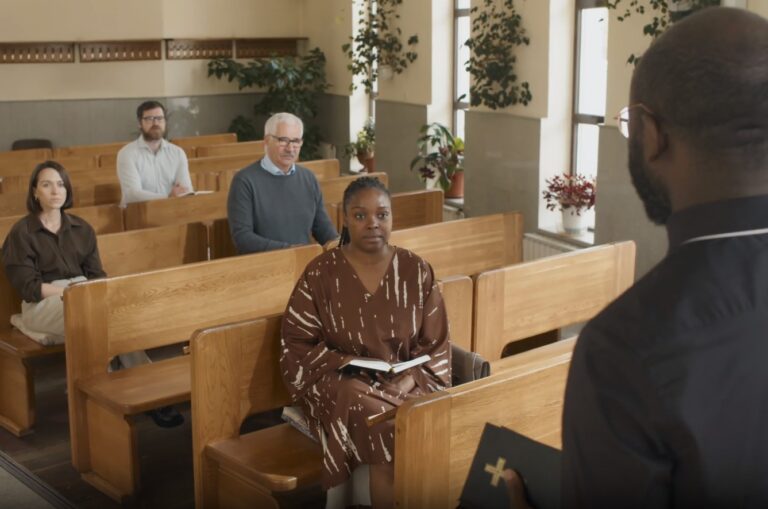In a world where challenges and uncertainties are ever-present, finding strength in one’s community, especially one rooted in faith, is invaluable.
This blog post explores different ways that people can find strength in their biblical community, based on the teachings of the Bible, the examples of faith-based organizations like Christian Healthcare Ministries, and the influence of communal bonds in our lives.
1. The Collective Strength of Prayer

Prayer, a fundamental practice in any faith-based community, serves as a powerful unifier and source of strength. When a community comes together in prayer, it creates a shared spiritual experience that reinforces collective faith and offers support to its members.
This unity in prayer provides comfort and a sense of belonging, especially in times of need.
Personal Empowerment Through Shared Prayer
While communal prayer is a collective activity, its impact on individuals is profound. It offers peace, clarity, and resilience, providing a personal sense of empowerment.
The act of praying together serves as a reminder of the community’s support, making personal journeys less lonely and more bearable.
2. Learning from Biblical Teachings

Biblical stories and teachings offer valuable lessons on resilience, courage, and faith. For example, the story of Esther highlights the power of courage and faith in the face of adversity.
By studying these narratives, individuals can find inspiration and guidance for their own lives, drawing strength from the wisdom of the past.
Applying Biblical Principles in Daily Life
Applying biblical teachings in everyday life is a practical way to draw strength from one’s faith. Principles such as loving one’s neighbor, bearing each other’s burdens, and showing kindness can transform personal interactions and strengthen community bonds, providing a solid foundation for mutual support.
3. Participate in Community Activities

Engaging in community activities, whether service projects, study groups, or social events, helps build stronger relationships within the community.
These shared experiences foster a sense of belonging and mutual understanding, creating a supportive network that members can rely on.
The Joy of Serving Together
Service activities, in particular, offer a chance to live out one’s faith in practical ways. Working together to help others not only benefits those in need but also strengthens the bonds within the community, creating a shared sense of purpose and fulfillment.
4. Offer and Receive Support

In a biblical community, both offering and receiving support are seen as blessings. By helping others, members experience the joy of giving and the fulfillment that comes from serving.
Likewise, receiving support in times of need is equally important, as it allows individuals to experience the love and care of their community.
Learn to Accept Help
Many struggle with accepting help, seeing it as a sign of weakness. However, in a faith-based community, accepting assistance is viewed as an opportunity for growth and connection.
It enables members to experience the full extent of their community’s care and strengthens communal bonds.
5. Promotion of Emotional and Spiritual Well-being

A biblical community provides a safe space for emotional expression and support. Members can share their struggles and triumphs, knowing they will be met with empathy and understanding.
This emotional support is crucial for personal well-being and resilience.
Spiritual Growth
Spiritual growth is a core aspect of a biblical community. Through teachings, mentorship, and shared experiences, members can deepen their faith and find strength in their spiritual journey.
This growth not only enriches their personal lives but also enhances their ability to support others.
6. Teachings of Galatians 6:2
Galatians 6:2 calls believers to bear one another’s burdens, a principle vividly demonstrated by organizations like Christian Healthcare Ministries.
The scripture guides communities in creating a culture of mutual support, empathy, and practical assistance.
Christian Healthcare Ministries as a Model
Christian Healthcare Ministries exemplifies how a community can live out the teachings of Galatians 6:2. Their approach to mutual aid goes beyond financial assistance; it encompasses emotional and spiritual support, setting an example for how biblical communities can support their members in holistic ways.
7. It is a Culture of Inclusivity and Respect

For a community to be a true source of strength, it must be inclusive. This means welcoming individuals from all walks of life, respecting their unique experiences, and ensuring that everyone feels valued and heard.
An inclusive community is better equipped to provide support and strength to all its members.
Respect as a Cornerstone
Respect is fundamental in a biblical community. It involves treating each other with dignity, kindness, and empathy. A respectful environment fosters positive relationships and a supportive atmosphere, enabling members to thrive and draw strength from one another.
Other Benefits You Can Gain From Being Active in a Christian Community
The depth of this support system provides numerous, often overlooked benefits that can profoundly impact an individual’s life.
Emotional Resilience

Being part of a faith-based community helps in developing emotional resilience. The shared experiences, coupled with the wisdom gleaned from others’ journeys, equip individuals to handle life’s adversities with greater ease.
This resilience is fostered not just in times of crisis but through regular interactions and shared life experiences within the community.
Spiritual Resilience
Continuous learning and engagement with spiritual teachings help in building spiritual resilience. This doesn’t just involve attending services or participating in bible studies but also engaging in deep, personal contemplation of faith and its application in the complexities of modern life.
For example, someone with more experience can be a perfect guide for you to understand more about stories found in the Book of Revelation.
Exposure to Diverse Perspectives
Interacting with a diverse group within a faith-based community broadens one’s perspective. It encourages individuals to look beyond their personal experiences and understand life from different viewpoints.
This expanded worldview fosters greater empathy and compassion, crucial traits for personal growth and community harmony.
Compassion through Shared Experiences

Shared experiences in a community cultivate a deep sense of compassion. By participating in others’ joys and struggles, individuals develop a more empathetic approach to life, learning to respond with kindness and understanding in a variety of situations.
Family Bonds in a Community Setting
Families involved in a community often find their bonds strengthened through shared beliefs and activities. This shared spiritual journey can bring families closer, providing a common ground for connection and understanding.
Improved Interpersonal Skills

Interacting regularly with a diverse group of people within a community setting enhances interpersonal skills. It teaches individuals how to communicate effectively, resolve conflicts amicably, and build strong, lasting relationships.
Personal Growth through Mentorship and Discipleship
Mentorship and discipleship are key aspects of many faith-based communities. These relationships provide guidance, wisdom, and support, playing a significant role in personal and spiritual growth.
Mental Well-being through Community Support

The support system in a faith-based community can significantly contribute to mental well-being. The sense of belonging, purpose, and unconditional support helps mitigate feelings of loneliness and anxiety, promoting mental health.
FAQs
How do we find strength through faith?
We find strength through faith by trusting in God’s power, love, and promises. Faith is confidence in God and His Word, which gives us hope, courage, and endurance. When we face difficulties or weaknesses, we can rely on God’s grace and strength to overcome them.
How did Jesus show strength?
Jesus showed strength by willingly suffering and dying on the cross for our sins. He demonstrated courage, patience, and faith in His Father’s will. He also showed strength by rising from the dead and defeating sin and death. His strength is made perfect in weakness, and He shares His power with those who believe in Him.
How do you find God’s strength when you are weak?
You can find God’s strength when you are weak by praying to Him, reading His Word, and relying on His Spirit. God promises to give you strength when you seek Him, trust Him, and obey Him. He also gives you strength through His people, who can encourage you, support you, and pray for you.
What are 3 scriptures on strength?
There are many scriptures on strength in the Bible, but here are three examples:
- Philippians 4:13: “I can do all things through him who strengthens me.”
- Isaiah 40:31: “But they who wait for the Lord shall renew their strength; they shall mount up with wings like eagles; they shall run and not be weary; they shall walk and not faint.”
- Psalm 18:2: “The Lord is my rock and my fortress and my deliverer, my God, my rock, in whom I take refuge, my shield, and the horn of my salvation, my stronghold.”.
How to ask Jesus for strength?
You can ask Jesus for strength by praying to Him in faith and honesty. You can tell Him your needs, your struggles, your fears, and your desires. You can also thank Him for His love, His grace, His presence, and His power. You can ask Him to fill you with His Spirit, to guide you with His Word, and to help you with His people. You can also praise Him for His goodness, His sovereignty, His faithfulness, and His strength.
Summary
Drawing strength from a biblical community involves much more than attending services or being part of a group. It’s about engaging in shared prayer, learning from biblical teachings, participating in communal activities, offering and receiving support, nurturing emotional and spiritual well-being, embodying scriptural principles like those in Galatians 6:2, and fostering a culture of inclusivity and respect.

